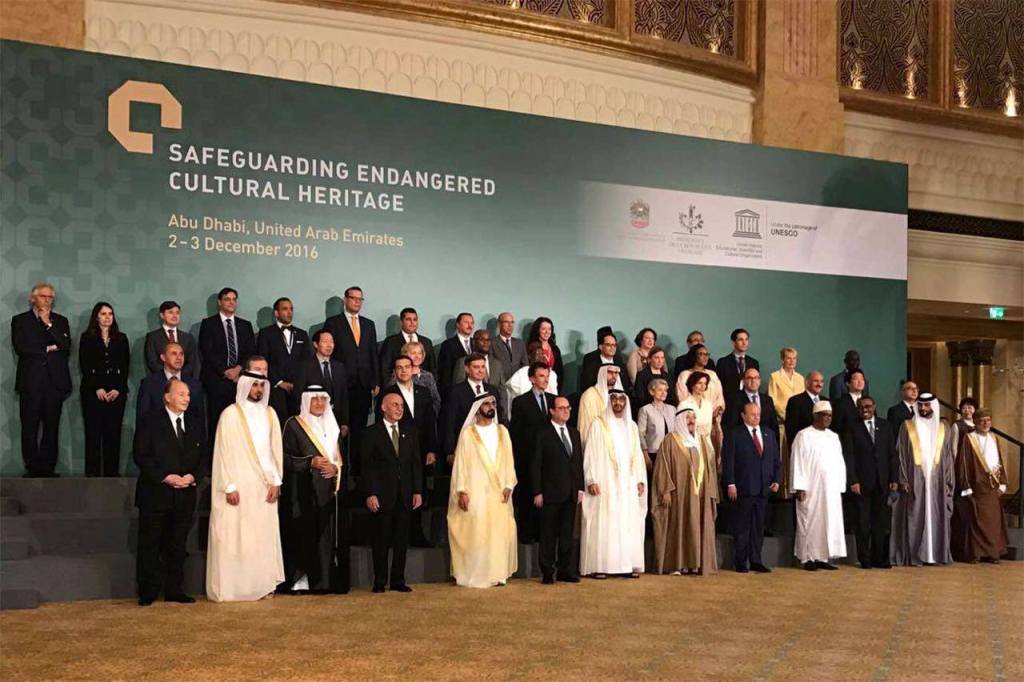
http://www.thenational.ae/uae/heritage/ ... -abu-dhabi
Safeguarding Cultural Heritage conference kicks off in Abu Dhabi
Mohammed Al Mubarak, Chairman of Abu Dhabi Tourism & Culture, speaks during the opening remarks of the international conference for the safeguarding of cultural heritage in conflict areas at Emirates Palace in Abu Dhabi on Friday. Christopher Pike / The National
Safeguarding Cultural Heritage conference kicks off in Abu Dhabi
Naser Al Wasmi
December 2, 2016 Updated: December 4, 2016 08:13 AM
ABU DHABI // "Building nations is not complete without safeguarding heritage," Sheikh Hazza bin Zayed told the Safeguarding Cultural Heritage Conference in the capital on Friday.
The deputy chairman of Abu Dhabi Executive Council was addressing the first day of the conference, where attendees heard reports of past atrocities as a prompt to forging meaningful outcomes for the future.
​The conference concludes Saturday, with the adoption of the Abu Dhabi Declaration in support of Unesco’s global mandate to protect cultural heritage during armed conflicts.
The mandate will define practical and sustainable means to safeguard cultural resources, as well as create a network of safe havens for threatened heritage.
French president Francois Hollande said France and the UAE, in partnership with Unesco, wanted to organise a major conference on the protection of endangered heritage, and that the preservation of world heritage was part of a battle led by the two countries against terror and extremism.
"I am proud that our two countries are behind this important initiative for the region and for the world," Mr Hollande told Aletihad newspaper, the Arabic-language sister daily of The National.
"Our common goal is to get concrete commitments to protect the world’s cultural heritage in places exposed to danger by extremism and barbarism, as is the case in Palmyra, Nimrod and Timbuktu. It comes to preserving the traces of the past in our cultures so that we can build the future," Mr Hollande said.
"This work is part of the battle led by France and the United Arab Emirates against obscurantism, for openness and culture. It is also the reason for the creation of the Louvre Abu Dhabi. This great French-Emirati project that will yield the opening next year of the world’s first international museum in the Arab world," he said.
The conference heard that the destruction of cultural heritage was not only collateral damage from conflict, but also a constant threat even during times of peace.
"Unfortunately, we see the illicit trafficking of items even without conflict, but in times of conflict we see, I would say, disastrous proportions of rooting and trafficking," said Irini Bokova, director-general of Unesco. "I would argue that it is recognised that the illicit trafficking of objects abroad from Syria is one of the ways of financing extremism, on that basis and on other decisions, we have established a platform."
Three speakers, Azedine Beschaouch, former minister of culture of Tunisia, Dr Samuel Sidibe, director of the national museum of Mali, and Dr Mounir Bouchenaki, a cultural heritage expert, shared their experience in protecting and conserving heritage affected by conflict in Cambodia, Mali and Bosnia-Herzegovina.
Last year two gunmen held museum visitors hostage in the Bardo National Museum attack in Tunisia, which resulted in 22 deaths along with the destruction of items in the museum.
In Mali this year, a local extremist destroyed historic mausoleums in Timbuktu and was sentenced in the Hague for committing a war crime.
Mohammed Al Mubarak, chairman of the Abu Dhabi Tourist Cultural Authority, said that although several attacks had happened in the region and the loss of history was at times irreplaceable, that work could be done.
"It is never too late. The Middle East and South Asia region has been a cultural burning platform for a while now – from the looting of the Egyptian museum at the start of the Arab Spring to the dynamiting of the Buddhas of Bamiyan, cultural genocide has been rampant in the region," he said.
" The immediate humanitarian concerns had to take precedence and once we had established processes for these, we mobilised forces to protect national heritage as a way of preserving the identity of these countries in conflict," he said.
Dr Bouchenaki’s work, however, involved several attempts at conserving heritage around the world and sometimes preserving it.
"It is on the basis of such a gathering to prepare a strategy because the work is immense, a lot has been lost but there is always something to be recuperated," Dr Bouchenaki said.
Although each speaker noted the deliberate destruction of cultural heritage sites in their respective countries, much of what was lost was driven by the illicit trade of antiquities on the black market.
Work with the Abu Dhabi Declaration will focus on that.
The conference is structured into panel discussions and presentations, giving first-hand accounts from international cultural experts on the successes and challenges in overcoming difficult situations faced in the protection and conservation of cultural heritage in conflict zones.
The panels also aim to set the stage for further discussions of the proposed strategies of the global initiative proposed by the UAE and France.